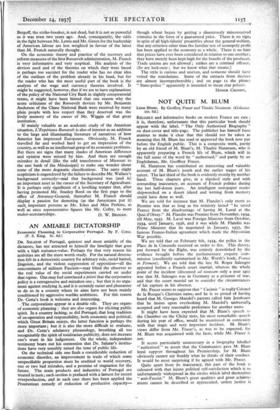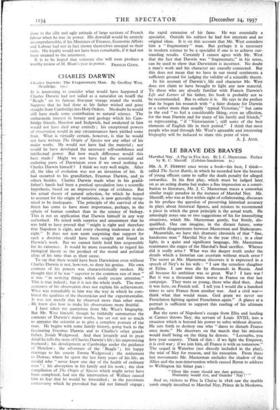NOT QUITE M. BLUM
Leon Blum. By Geoffrey Fraser and Thad& Natanson. ios. 6d.)
RELIABLE and informative books on modern France are rare ; it is, therefore, unfortunate that this particular book should appear with the label, " The Only Authorised Biography " on dust-cover and title-page. The publisher has himself been anxious to make it clear that this should not be taken as meaning that M. Blum has read or approved the book now put before the English public. This is a composite work, partly by an old friend of M. Blum's, M. Thad& Natanson, who is apparently preparing a French life of Blum, which will in the full sense of the word be " authorised," and partly by an Englishman, Mr. Geoffrey Fraser.
M. Natanson has contributed an interesting and valuable account of M. Blum's youth and the earlier stages of his career. The last third of the book is evidently mostly by another hand. These chapters give, in a slipshod style and with astounding inaccuracy, an account of French politics during the last half-dozen years. An intelligent newspaper reader shipwrecked on a desert island and writing from memory could have done as well.
We are told for instance that M. Flandin's only merit as Premier was that as long as his ministry lasted " he saved France from the disadvantage of having M. Laval at the Quai d'Orsay." M. Flandin was Premier from November, 1934, till May, 1935. M. Laval was Foreign Minister from October, 1934, until January, 1936, and it was while M. Flandin was Prime Minister that he negotiated in January, 1935, the famous Franco-Italian agreement which made the Abyssinian War possible.
We are told that on February 6th, 1934, the police in the Place de la Concorde received an order to fire. This theory, put forward by the Right, was entirely demolished by the evidence brought before the parliamentary enquiry com- mission (excellently summarised in Mr. Werth's book, France in Ferment). We are told that the late M. Roger Salengro appeared before a French court martial, whereas the whole point of the incident (discussed ad nauseam only a year ago) was that M. Salengro was in Germany as a prisoner of war, and that the court martial sat to consider the circumstances of his capture in his absence.
Mr. Fraser seems to suppose that " Casimir " is really Colonel de la Rocque's Christian name, and he is so proud of having heard that M. Georges Mandel's parents called him Jeroboam that he insists upon overlooking M. Mandel's universally accepted and very reasonable preference for another name.
It might have been expected that M. Blum's speech to the Chamber on the Clichy riots, his most remarkable speech during his year of office, would be mentioned in connexion with that tragic and very important incident. M. Blum's views differ from Mr. Fraser's, as was to be expected, for M. Blum was acquainted with the facts, while Mr. Fraser is not.
It seems particularly unnecessary in a biography labelled " authorised " to assert that the Communists gave M. Blum loyal support throughout his Premiership, for M. Blum obviously cannot say frankly what he thinks of their conduct. It would be most surprising if he agreed with Mr. Fraser.
Quite apart from its inaccuracy, this part of the book is coloured with that jejune political self-satisfaction which is so unfortunately widespread in the circles which label themselves " anti-Fascist." M. Blum's great qualities and great achieve- ments cannot be described or appreciated, unless justice is
done to the silly and ugly attitude of large sections of French labour when he was in power. His downfall would be entirely incomprehensible, if his Ministers of Finance, Economic Affairs and Labour had not in fact shown themselves unequal to their tasks. His loyalty would not have been remarkable, if it had not been strained to the uttermost.



































 Previous page
Previous page